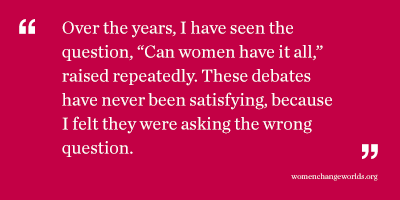 Sheryl Sandberg’s recent book, Lean In, created a media frenzy. Before that, Ann-Marie Slaughter’s 2012 article in The Atlantic, “Why Women Still Can’t Have It All,” was hailed as another round in the Mommy Wars. It’s time to call a truce.
Sheryl Sandberg’s recent book, Lean In, created a media frenzy. Before that, Ann-Marie Slaughter’s 2012 article in The Atlantic, “Why Women Still Can’t Have It All,” was hailed as another round in the Mommy Wars. It’s time to call a truce.
I’d like to begin with a brief personal history. When I was ten, my parents divorced. While my father provided some financial support, it was not enough to support four kids. So, when I was 13, my mother put my four-year old brother in nursery school and went back to work. I learned at my mother’s knee that women do what they need to do to take care of their families.
By the time I was 25, I had worked as a babysitter, cafeteria worker, sales clerk, library clerk, passport adjudicator, child care teacher, community organizer, drug program counselor, and research assistant. As a child of the second wave of the women’s movement, I had sung along to Helen Reddy’s I Am Woman, hear me roar. I knew about women’s work.
 When I was 39, I gave birth to my daughter. I took a few months off with her, using up most of my sick leave, because this was pre-Family Medical Leave Act, and Wellesley College did not yet have paid parental leave. While at home, I discovered that parenthood was hard work, work that required a different rhythm than my paid work.
When I was 39, I gave birth to my daughter. I took a few months off with her, using up most of my sick leave, because this was pre-Family Medical Leave Act, and Wellesley College did not yet have paid parental leave. While at home, I discovered that parenthood was hard work, work that required a different rhythm than my paid work.
All of these experiences have informed my teaching and research on women’s experiences with paid work and family work.
Over the years, I have seen the question, “Can women have it all,” raised repeatedly. These debates have never been satisfying, because I felt they were asking the wrong question. The reality is that almost two-thirds of women with children under the age of six are employed. Overall, women’s rates of employment are fast approaching men’s. Moreover, employed women are even more likely than women not in the labor force to have children.
According to the research, for most women, as for most men, employment has its ups and downs. Good jobs contribute to health and well-being, including self-esteem and feelings of efficacy, and provide opportunities to make a contribution to others. Bad jobs are exhausting, mind- and body-numbing and bad for our health and the health of those around us. One of the questions employed women and men ask is, “How can I find and keep a good job, a career that I enjoy and value?”
But what about “having it all?” I hear many young women concerned about whether their job and career choices will jeopardize their future family, and whether their desire for a family will inhibit their ambitions.
The research clearly shows that combining paid work with raising children is actually a positive for most women and men. Paid work provides working parents with the income to raise their families, and can provide a sense of well-being that spills over to home, while providing a balance in their lives.
Even when combining work and family is stressful, most workers report more benefits from the combination than drawbacks. For the majority of women, and men, the question is, “how can I manage the stresses, and what can my employer do to support me to be the best worker as well as the best parent?”
Based on the research, I second Sheryl Sandberg’s advice: “don’t leave before you leave.”
However, for some parents, work and family is difficult to manage. Because mothers still do more of the day-to-day work of parenting young children, mothers of babies sometimes face more work-family conflict than they can manage, especially if they have very demanding jobs, or very demanding home lives, such as a baby who is sick more than other babies are. Parents with larger families, a serious illness or crisis in the family, or with one or both adults employed in demanding jobs, may find that home demands cannot be met while maintaining demanding jobs, and something needs to give.
For these people, the question is, “how can I manage caring for my family?” For Anne-Marie Slaughter, and others like her, the answer to that question was to make changes in their paid work. Dr. Slaughter chose to leave the Washington D.C circles of power for a full-time job as a professor, where she could be more available to her family; others choose to take time out from paid work, or to leave completely.
It’s time, then, to stop the media fascination with the “Mommy Wars.” No one wins in the current climate. Instead, we need to step up to the challenge of creating good jobs for all workers, and providing parents with needed supports, including family-friendly workplaces, as well as affordable child care and health care.
Nancy Marshall, Ed.D. is an Associate Director and Senior Research Scientist at the Wellesley Centers for Women (WCW) at Wellesley College. She leads the Work, Families and Children Team at WCW and is an Adjunct Associate Professor at Wellesley College.
When you subscribe to the blog, we will send you an e-mail when there are new updates on the site so you wouldn't miss them.
Comments 1
Excellent points! Let's bring the focus back to family friendly workplaces and affordable, quality childcare. Doesn't it make sense that providing greater workplace support and flexibility to working parents would improve worker productivity and might actually cost an employer less than cost estimates based only on leave time might suggest? Is there research out there to support this hypothesis? If not, it seems like an important avenue to explore.